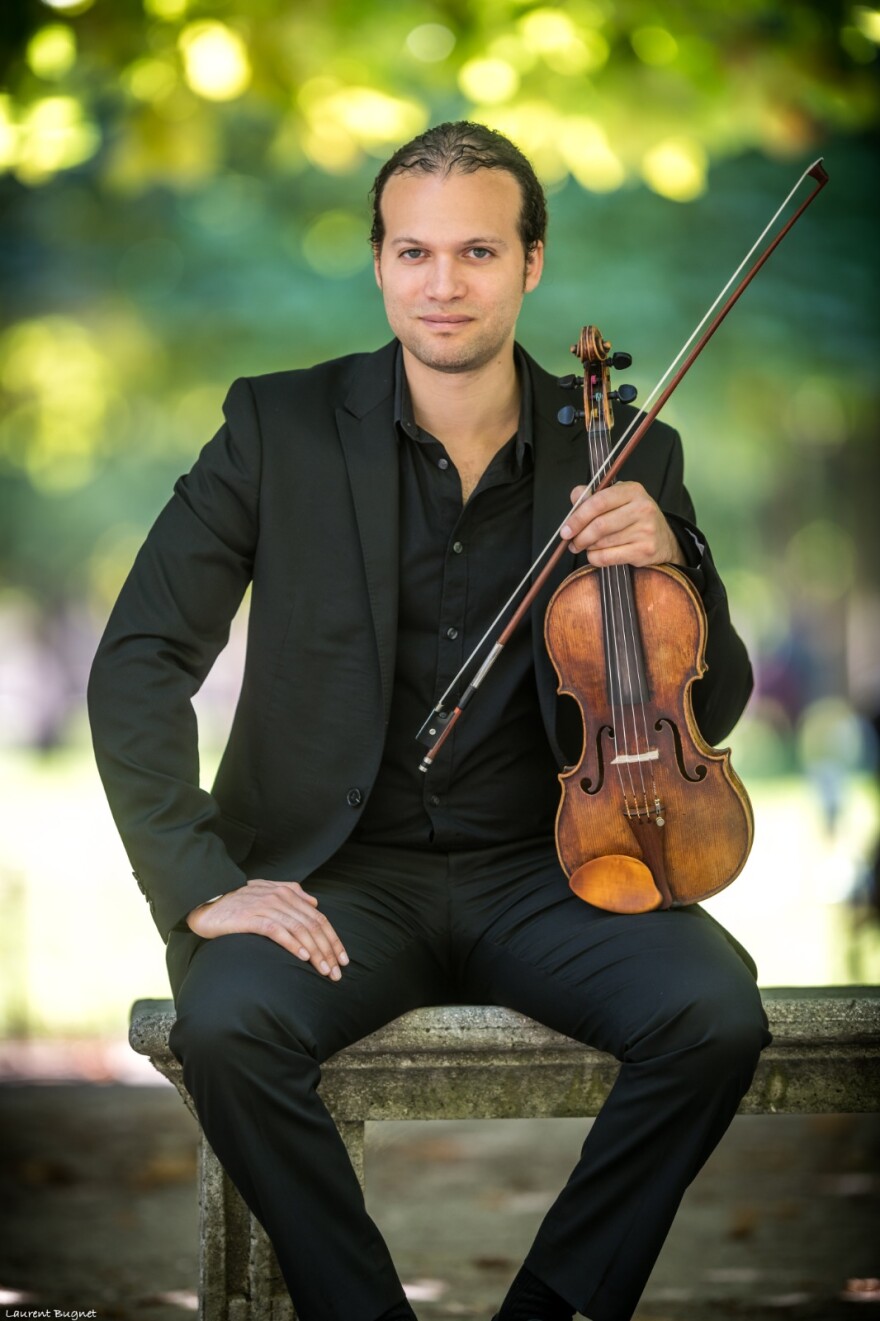Musical talent has a way of bringing families together. The stories of Wolfgang and Nannerl Mozart, Felix and Fanny Mendelssohn, the Labèque sisters, Ottensamer brothers, and Kanneh-Mason siblings all suggest that some of a young musician’s most promising opportunities for collaboration may very well be seated at the kitchen table. For the six siblings of the Grimbert-Barré family, though, music is not only a means of interacting with each other—it’s also a way of engaging with their family history.
“We all learned piano through our mother. And we all also picked another instrument,” Romuald Grimbert-Barré says. According to Romuald, who is a violinist, the siblings diversified in order to create more possibilities for performing together. Three of them in particular—Romuald, Maxence, and Jonathan—decided to form a string trio.
“I think Maxence—who is one year older than I am—he kind of switched to viola so that we could play as a trio, because he had already started with violin. But he switched pretty quickly.” Romuald credits his brother Jonathan, a cellist, with the idea to form the three-person chamber ensemble.

In addition to playing well-known works in the chamber repertoire, the brothers also bring their own family history to life through their performances. Honoring the legacy of their grandfather Amédée Barré has proven especially rewarding for them.
“Amédée Barré, he’s a pioneer in the family, in a way,” Romuald says. “He was a clerk at the justice court of Pointe-à-Pitre, the capital of Guadeloupe. So that was his main occupation/official occupation. But he loved music so much that he used to perform with friends every week. He played mandolin very, very well. And he used to teach, also, violin.”
According to Romuald, Amédée led an active life as a musician on Guadeloupe. “So he founded, also, the symphony orchestra with some of his friends. And they performed, also, some Caribbean music—not only classical music. And he composed for his ensemble, for his friends, a lot of Creole Songs.”
Music won Amédée more than friends, Romuald says.
“It’s funny because that’s actually how he met my grandmother. She wanted to study violin and they met because he was also a violin teacher.”
Romuald considers a few of his grandfather’s compositions to be reflective of the highs and lows of this particular relationship. “Reviens-moi,” “Bonheur Troublé,” and “Si o vlé moi vlé”—which the Grimbert-Barré Trio has performed in a set titled Creole Songs at the Colour of Music Festival in Charleston, SC—might serve as a kind of backwards journey through one part of their romance, Romauld says.
As he sees it, “Si o vlé moi vlé,” which embodies the characteristics of the Caribbean beguine dance, represents the start of the relationship. “I imagine [my grandfather] in that situation flirting with, I guess, my grandmother before, of course, they got married and everything . So, it means ‘If you want’—they’re just playing games together.”

Romuald says that the second piece of the set reflects rockier moments in the relationship. “‘Bonheur Troublé’ is basically the moment in which the couple started having problems and, well, broke up, basically.” He adds that the interpretation which he and his brothers have given to the piece has been a point of contention in the Grimbert-Barré family. “We play it a little bit like a tango. But it’s not a tango, to be honest. We often had debates over that with my mother because she says we play it a little too fast.”
“Reviens-moi,” Romuald says, is a piece of intense longing. “The song ‘Reviens-moi’ could be the last step. The waltz. Slow waltz. It’s basically, I would say, my grandfather asking my grandmother to come back. ‘Reviens-moi’ means ‘come back to me.’ So, it’s a little melancholy, so he tells a lot of beautiful things, what he misses—and eventually she comes back and they’re happy again.”
When it comes to telling family stories through music, the Grimbert-Barré siblings don’t stop with their grandfather. For cellist Jonathan Grimbert-Barré, there’s another part of their family's past that warrants musical expression. Jonathan, who is also a composer and film music producer, wrote his “Tribal” Triple Concerto for String Trio and Orchestra to honor the origins and history of his mother’s ancestors who were enslaved on Guadeloupe.

“When I do a new musical piece, I always need a script before," Jonathan says. "It has to be based on something authentic to me. So, this concerto is linked with the origin of my mother.”
Jonathan was especially moved by Alex Haley’s Roots, even though he acknowledges the book was too difficult for him to finish.
“Something touched me a lot, and at the same time, shocked me a lot,” Jonathan says of Haley’s groundbreaking work. “And I decided to base each movement of this concerto on this book.”
Jonathan says that the first movement, which he describes as a celebration, incorporates the rhythm of the joyful Djagbe dance. “The second movement is darker,” he continues, “because it focuses on the anxiety of two parents for their children…we don’t know what happened and, unfortunately, the children don’t come back. So that’s why the third movement describes the war cries and uprising of the tribe against the capture of their people [by] slavers.”
Although it’s not an easy history to reckon with, Jonathan felt compelled to use his compositional craft to engage with it.
"I had to do something with this. I had to bring it [to] music because this is the way I am able to talk. This is my language. You know, when we play that piece in front of the public, and when you see the reaction of the public at the end of the concert, you just feel that you did something for the history.”
In this Sonatas & Soundscapes episode that aired Monday, February 1st, South Carolina Public Radio’s Bradley Fuller speaks with Romuald and Jonathan Grimbert-Barré about their artistic careers and musical family history, with a special emphasis on their grandfather Amédée Barré. Also included are recordings of Romuald performing an excerpt of Max Bruch's Violin Concerto No. 1, as well as the Grimbert-Barré Trio performing Amédée Barré's Creole Songs and Jonathan Grimbert-Barré's "Tribal" Concerto from the 2016 and 2017 seasons of the Colour of Music Festival in Charleston, SC.



